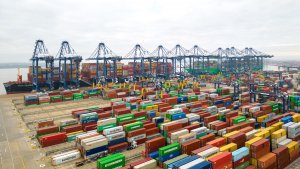With Brexit negotiations reaching a critical stage, SMEs should be giving serious thought to life outside the EU.
Brexit: The Incentive For Businesses To Go Beyond The EU
With Brexit negotiations reaching a critical stage, SMEs should be giving serious thought to life outside the EU.

With the cabinet still unsure on how best to proceed with future customs arrangements following Brexit, there is a lack of clarity from the top on what the future holds for businesses and consumers alike.
Theresa May has recently pledged to publish a white paper with ‘precise explanations’ on key aspects of Britain’s post-Brexit future, but the reality is that many companies are currently in a state of limbo, and don’t know how to plan for their future with so little concrete information to help build a plan of attack.
You can see why so many organisations are reticent to prepare for Brexit, with the exact changes still to be finalised. But, as luck would have it, many of the building blocks needed to prepare for trading post-Brexit are in fact best practice for creating an international growth strategy. Therefore, it makes sense for businesses to start planning for global expansion now.
Taking that into account, SMEs should view Brexit as an opportunity rather than a hinderance, Brexit will enable them to create a plan of action that can facilitate growth and allow SMEs to do business in fast-growth regions and on marketplaces they are yet to even consider. This could open up new doors for many fast-growing companies, provided they treat delivery as a key part of their growth strategy.
The trading relationship between Britain and the EU is in a state of flux, both figuratively and literally. Businesses and retailers should consider shifting their focus away from their current customer-base of neighbouring countries, to growth opportunities outside of the EU, as well as with key marketplaces like, Etsy, eBay or Alibaba.
This may seem intimidating to SMEs at first, but with the right support and guidance, that forward-thinking approach could pay dividends as they look to establish themselves in new markets and increase revenue. With that said, it’s vital that these companies do their due diligence and sort delivery operations accordingly, to ensure they reap the rewards.
Exploring new marketplaces
Brexit will undoubtedly force some logistical challenges within EU regions. With free trade between the UK and EU unlikely, new tariffs and stricter border controls will be enforced when delivering to and from these countries. This will increase the cost and delivery time for both customers and companies.
With EU trade making up a sizeable 44% of all UK exports, if companies continue to be so heavily reliant on EU trading, their profit margins will likely take a hit and supply chains will be slower. Moreover, businesses that manufacture or source products will also need to consider regulation on a country-by-country basis, adding to the admin that companies will have to undertake.
As trading within the EU is set to become more demanding and less convenient, organisations would do well to start targeting strong marketplaces and emerging regions of rapid eCommerce growth, such as China, Russia and Brazil, before the market becomes over-saturated.
Companies could see major growth to their business if they have the right approach and partner to help maximise their success in these regions.
This is a significant growth opportunity given that retail spend in this area was priced at $1.47 trillion last year, with 90% of that concentrated in the top five marketplaces, three of which are in China. The hurdles Brexit will raise within the EU provide a real incentive for companies to explore international expansion and diversify their revenue streams.
Solutions to minimise post-Brexit trading in the EU
With new taxes and duties to deal with when delivering to EU countries, customers will face higher delivery costs following Brexit, and businesses need to work out how to best cope with the additional expenses. For example, customers will not appreciate unexpected delivery charges at checkout when making a purchase – with research from Baymard institute indicating that a lack of transparency at checkout is responsible for as much as 24% of all cart abandonment.
As such, it’s imperative that companies ensure they are transparent with their pricing and have the requisite software capable of providing clear delivery costs and options at the point of checkout.
If retailers make checkout easy to navigate and put all the relevant delivery information in one place, customers are less likely to abandon their cart. Customers will acclimatise to the additional delivery charges following Brexit, but they will never acclimatise to poor customer service.
SMEs will also need to be vigilant of the regional complexities that delivering to new countries will bring, as well as the changes enacted by countries they already deliver to. For instance, companies shipping to Saudi Arabia would need to take in to account the cultural preference to ‘pay on delivery’ rather than at checkout and be able to accommodate this.
International nuances like this highlight why it’s important for companies to partner with operations and logistics end-to-end advisors that can fill gaps in their knowledge. Each region will have to be dealt with separately in terms of delivery approach and tariffs, and companies need to be attuned to this.
Companies can heavily benefit from trading outside of the EU, but they’d be foolish to do so without the necessary support systems in place. Support should also be sought to navigate the time-consuming admin processes that border control will bring, to make sure that it’s not a drain on company resources and minimises the delay to the supply chain.
While the temptation for businesses is to wait for the changes to trade, in and outside of the EU, to be finalised before planning business strategy post-Brexit, it’s an inclination they would do well to avoid. The reality is that preparing for Brexit also prepares companies for international expansion, so their efforts would be worthwhile regardless.
Brexit merely provides an excuse for SMEs to put into place the international growth strategy they’ve had planned for years but maybe felt it was too hard. This is understandable but the good news is that it needn’t be.
Much of the complexity and cost can be taken away if SMEs look for global delivery partners like GFS to get the expertise, services and price they need in order to offer their consumers a wide choice of delivery options to increase basket conversion, and then deliver it to their doorstep, no matter where they are in the world.
While the additional costs enforced by Brexit will be inconvenient at first, with the successful addition of new marketplaces to sell through and easy ways to deliver, companies may well come to see Brexit as the incentive they needed to spur international growth.
Dan Ennor is commercial director at Global Freight Solutions.
Thanks for signing up to Minutehack alerts.
Brilliant editorials heading your way soon.
Okay, Thanks!

